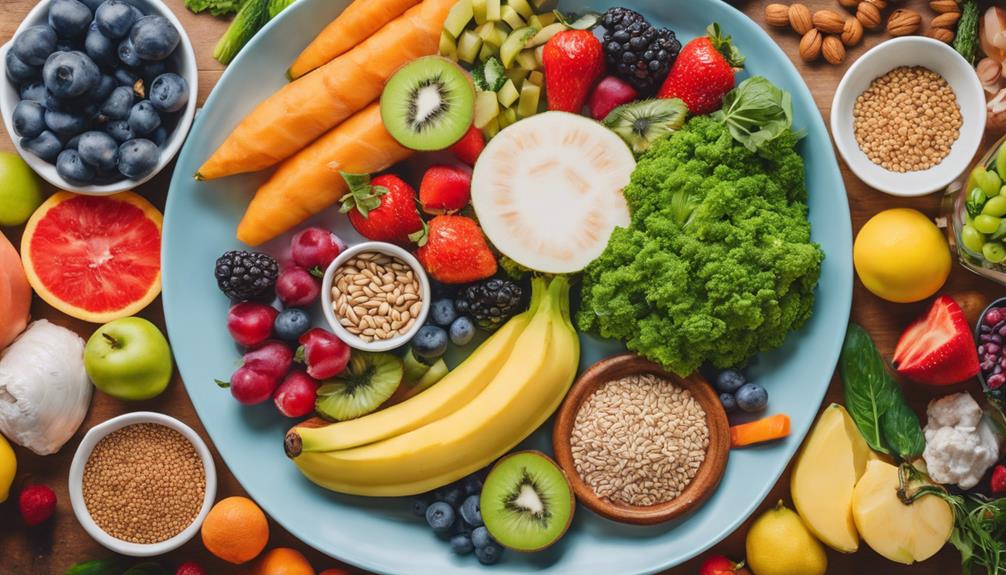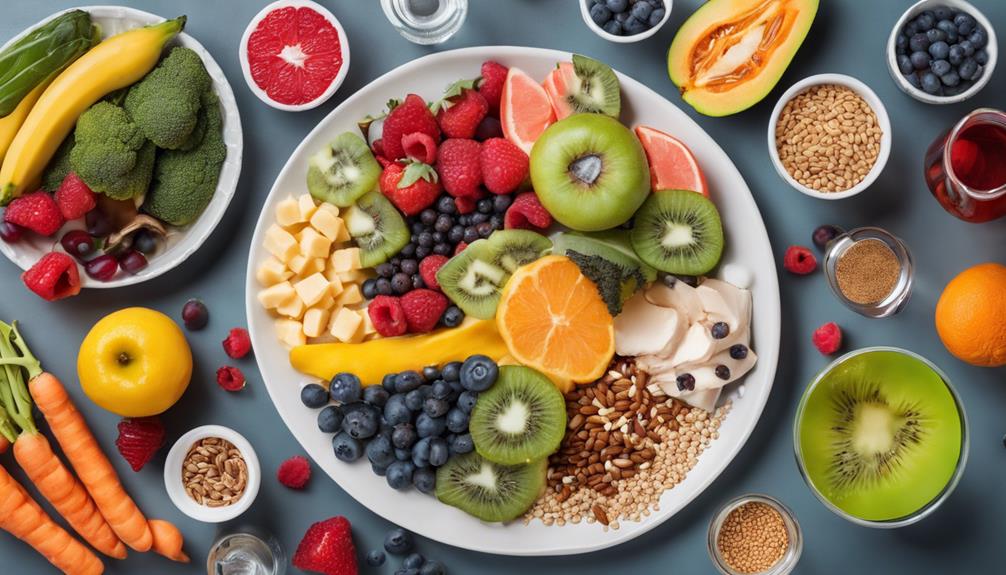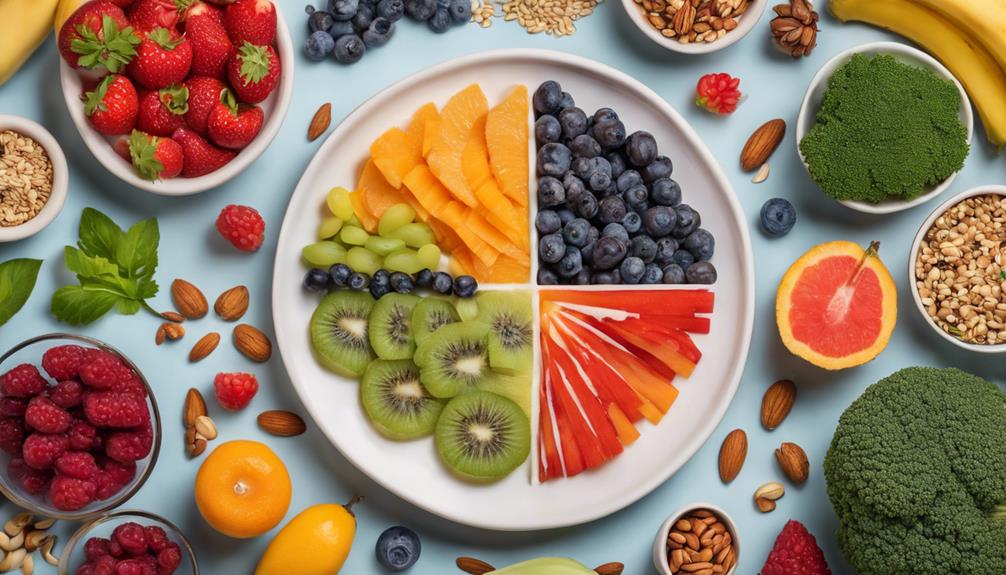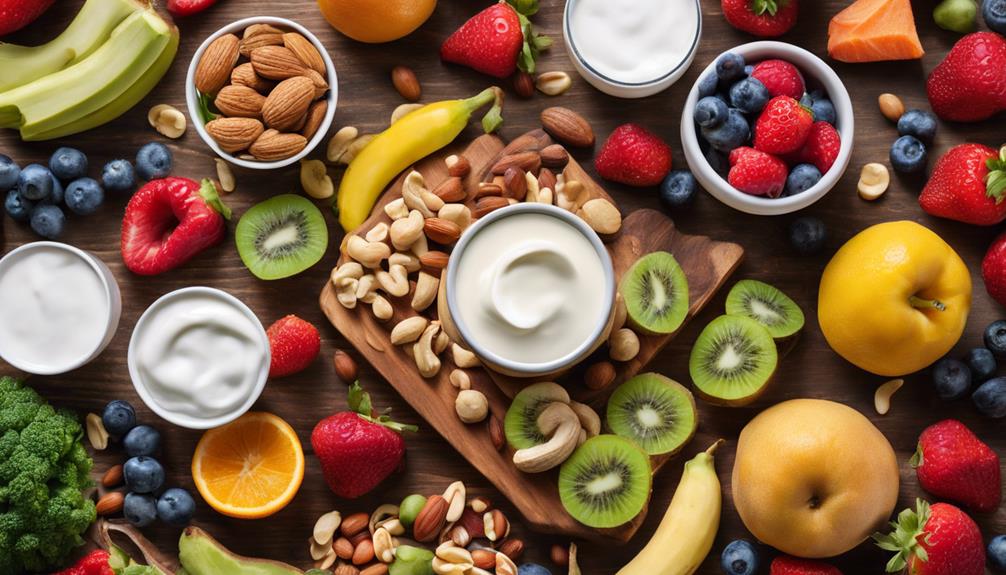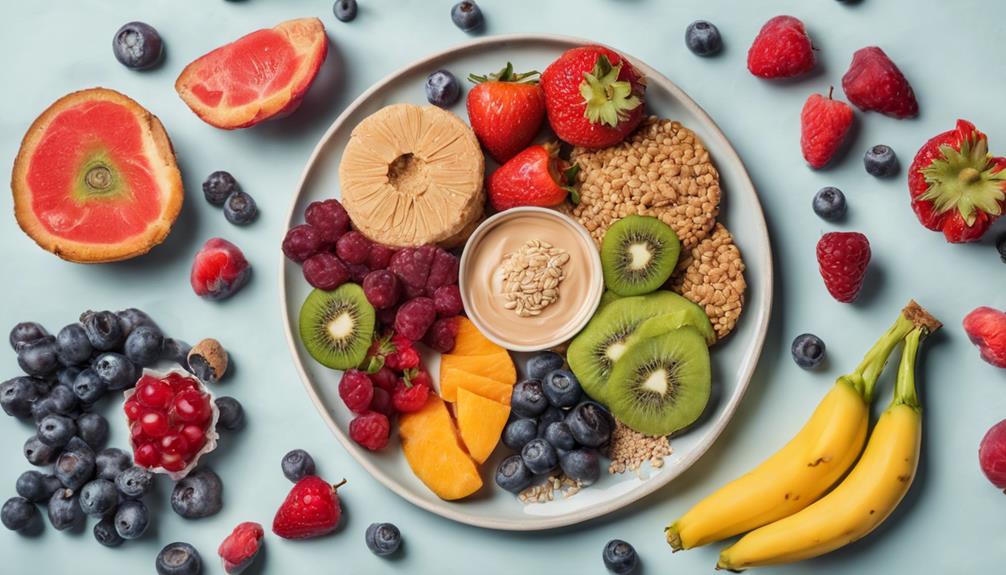How to Achieve Balanced Nutrition
Imagine your plate as a canvas where each color represents a different nutrient essential to your well-being. Achieving balanced nutrition is not just about what you eat but also how you nourish your body. By exploring the intricate dance of macronutrients, micronutrients, and other vital components, you can uncover the secrets to unlocking a healthier you. But the journey doesn't stop there; there are more layers to peel back, more tips to uncover, and a world of possibilities awaiting your exploration.
Key Takeaways
- Prioritize colorful fruits and vegetables for essential nutrients.
- Balance macronutrients: carbohydrates, proteins, and fats for energy.
- Include micronutrient-rich foods like nuts and seeds.
- Stay hydrated with 8-10 cups of water daily.
- Practice portion control and mindful eating habits.
Importance of Balanced Nutrition
Balanced nutrition is essential for maintaining optimal health and well-being. Achieving daily balance through nutrient-dense foods is key to supporting your body's functions and overall vitality. Nutrient density refers to the amount of essential nutrients per serving of food, ensuring you get the most out of what you eat.
When you focus on nutrient-dense foods, you provide your body with the necessary vitamins, minerals, and antioxidants it needs to thrive. Incorporating a variety of fruits, vegetables, whole grains, lean proteins, and healthy fats into your meals helps you meet your daily nutritional requirements.
Strive for a colorful plate, as different colors in fruits and vegetables often indicate a variety of essential nutrients.
A well-balanced diet not only fuels your body but also supports your immune system, energy levels, and overall well-being. By prioritizing nutrient density and daily balance, you can take a proactive approach to caring for your health.
Understanding Macronutrients
To optimize your nutritional intake, it's crucial to understand the role of macronutrients in your diet. Macronutrients are nutrients that provide energy and are essential for various bodily functions. These include carbohydrates, proteins, and fats. Each macronutrient serves a specific purpose in your body.
Carbohydrates are your body's primary energy source, proteins are crucial for muscle repair and growth, and fats play a role in hormone production and nutrient absorption.
Balancing your macronutrient intake is key to maintaining a healthy diet. The macronutrient breakdown refers to the percentage of carbohydrates, proteins, and fats in your daily calorie intake. The ideal macronutrient breakdown varies depending on individual goals and needs. Nutrient ratios, such as the popular 40-30-30 (carbohydrates-proteins-fats) ratio, can serve as a guideline, but it's important to adjust based on your specific requirements.
Understanding macronutrients and their roles in your diet can help you make informed choices to support your overall health and well-being. Remember, a balanced diet includes a proper mix of carbohydrates, proteins, and fats to fuel your body optimally.
Incorporating Micronutrients
When it comes to optimizing your nutrition, incorporating micronutrients is essential for supporting various bodily functions and overall health. Micronutrients, such as vitamins and minerals, play a crucial role in maintaining a well-balanced diet. To ensure proper absorption of these micronutrients, it's important to consume a diverse range of fruits, vegetables, whole grains, nuts, and seeds.
Micronutrient deficiencies can lead to a variety of health issues, affecting your energy levels, immune system, and cognitive function. To prevent deficiencies, focus on including a colorful array of fruits and vegetables in your meals. Additionally, consider incorporating sources of essential minerals like iron, calcium, and zinc into your diet.
To enhance micronutrient absorption, pair foods rich in vitamin C with iron-rich foods, as vitamin C aids in iron absorption.
Similarly, consuming vitamin D alongside calcium-rich foods can improve calcium absorption. By paying attention to your intake of micronutrients and ensuring proper absorption, you can support your overall health and well-being.
Hydration and Nutrition
How crucial is proper hydration for supporting optimal nutrition and overall well-being? Water intake plays a vital role in maintaining a well-balanced diet and promoting good health.
Hydration is essential for nutrient absorption, as water helps transport nutrients throughout your body and aids in various metabolic processes.
To ensure you're adequately hydrated, aim to drink at least 8-10 cups of water per day, adjusting based on your activity level and environment. Remember, staying hydrated isn't just about drinking water when you feel thirsty; it's a continuous process that your body requires to function optimally.
When you're well-hydrated, your body can efficiently absorb essential nutrients from the foods you consume, supporting overall health and well-being. Proper hydration also helps regulate body temperature, improve digestion, and enhance cognitive function.
Make it a habit to prioritize your water intake alongside your meals to maximize nutrient absorption and promote a healthy lifestyle.
Portion Control Strategies
Proper portion control is a fundamental aspect of maintaining a well-rounded diet and healthy lifestyle. Mindful eating is key to portion control. Begin by listening to your body's hunger cues and stopping when you feel satisfied, not overly full. Avoid distractions while eating, such as watching TV or using your phone, as this can lead to overeating. When serving yourself, opt for smaller plates and bowls to encourage smaller portions.
Making healthy choices is also crucial for portion control. Include a variety of nutrient-dense foods in your meals, such as fruits, vegetables, whole grains, lean proteins, and healthy fats. Prioritize these foods on your plate to ensure you're getting the necessary nutrients without overdoing it on portion sizes.
Be mindful of high-calorie, low-nutrient foods like sugary snacks and processed foods, as these can easily throw off your portion control efforts. By practicing mindful eating and making healthy choices, you can effectively manage your portions and support your overall health and wellness.
Meal Planning Tips
To ensure a balanced and nutritious diet, effective meal planning is essential. Start by making a grocery list based on your meal plan to avoid impulse buys.
When grocery shopping, focus on fresh fruits, vegetables, lean proteins, and whole grains. Incorporate a variety of colors and textures to ensure a diverse nutrient intake.
To make meal planning easier, consider batch cooking and preparing meals in advance. This can save time during busy weekdays and prevent unhealthy food choices.
Look for recipe ideas that aren't only delicious but also nutrient-dense. Experiment with different cuisines and cooking techniques to keep meals exciting and enjoyable.
Remember to include a balance of macronutrients – carbohydrates, proteins, and healthy fats – in your meals. By planning your meals ahead of time and being mindful of your grocery choices, you can create a well-rounded diet that supports your overall health and well-being.
Smart Snacking Choices
After mastering the art of meal planning, the next step towards a balanced diet involves making smart snacking choices. Snacks can either complement your nutrition or derail your efforts, so it's crucial to choose wisely. Here are some tips to help you snack smarter:
- Snack swaps: Instead of reaching for sugary or salty snacks, opt for nutrient-dense choices like fresh fruits, vegetables with hummus, or Greek yogurt with a sprinkle of nuts.
- Nutrient timing: Aim to have a snack around mid-morning and mid-afternoon to keep your energy levels stable throughout the day. Pairing a carbohydrate with a protein or healthy fat can help you feel satisfied until your next meal.
- Portion control: Even healthy snacks can contribute to excess calorie intake if consumed in large amounts. Use small containers or plates to control portion sizes.
- Hydration: Sometimes, thirst can be mistaken for hunger. Stay hydrated by drinking water throughout the day to avoid unnecessary snacking.
Reading Food Labels
Understanding how to read food labels is a fundamental skill for making informed choices about your nutrition. When interpreting food labels, pay attention to serving sizes, calories per serving, and the % Daily Value (%DV) for key nutrients. Here is a helpful guide to assist you in understanding food labels:
| Nutrient | Amount per Serving | % Daily Value |
|---|---|---|
| Total Fat | 10g | 15% |
| Saturated Fat | 2g | 10% |
| Cholesterol | 20mg | 7% |
| Sodium | 300mg | 13% |
Nutritional analysis allows you to compare different products and choose those that align with your health goals. Look for lower amounts of saturated fat, cholesterol, and sodium, while aiming for higher fiber and vitamin content. Remember, the ingredients list can also provide valuable information about the product's quality. By mastering the skill of reading food labels, you empower yourself to make healthier food choices tailored to your nutritional needs.
Mindful Eating Practices
Utilizing mindfulness while eating can significantly impact your overall relationship with food and your body. By incorporating mindful eating practices into your daily routine, you can cultivate a deeper connection with your food, enhance your dining experience, and improve your overall well-being. Here are some tips to help you practice mindful eating:
- Food Journaling: Keeping a food journal can help you track your eating habits, identify patterns, and become more aware of your relationship with food.
- Mindful Cooking: Engage all your senses while preparing meals. Focus on the colors, textures, smells, and tastes of the ingredients to enhance your connection with the food you're about to eat.
- Sensory Eating: Slow down and savor each bite. Pay attention to the flavors, textures, and sensations in your mouth to fully experience and appreciate your meal.
- Intuitive Dining: Listen to your body's hunger and fullness cues. Eat when you're hungry and stop when you're satisfied, honoring your body's natural signals.
Eating Out Healthily
To maintain a balanced approach to nutrition, it's essential to consider your food choices even when dining out. When faced with restaurant options, look for establishments that offer healthy choices. Opt for dishes that include lean proteins, whole grains, and plenty of vegetables. Avoid items that are deep-fried, covered in creamy sauces, or high in added sugars and sodium.
Many restaurants now provide nutritional information on their menus or websites, allowing you to make more informed decisions. When ordering, consider asking for dressings and sauces on the side, choosing grilled or steamed options over fried foods, and selecting water or unsweetened beverages instead of sugary drinks.
If you're unsure about healthier choices at a particular restaurant, don't hesitate to ask your server for recommendations or modifications to suit your preferences. Remember that eating out healthily is about making smart choices that align with your nutritional goals. By being mindful of your selections, you can enjoy dining out while supporting your overall well-being.
Balancing Treats and Nutrient-Dense Foods
When it comes to achieving balanced nutrition, one key aspect to focus on is striking a balance between indulging in treats and consuming nutrient-dense foods. Moderating indulgences and opting for nutrient-rich options are crucial steps in maintaining a healthy diet. Here are some tips to help you find that equilibrium:
- Plan your treats: Allow yourself to enjoy your favorite treats occasionally, but plan when and how much you'll indulge. Being mindful of your treat consumption can help prevent overindulgence.
- Incorporate nutrient-dense foods: Make sure the majority of your meals consist of nutrient-rich options such as fruits, vegetables, whole grains, lean proteins, and healthy fats. These foods provide essential vitamins, minerals, and antioxidants that support overall health.
- Practice portion control: When enjoying treats, pay attention to portion sizes. This can help you savor the treat without going overboard on calories or unhealthy ingredients.
- Stay hydrated: Sometimes cravings for treats can be mistaken for dehydration. Make sure to drink an adequate amount of water throughout the day to help maintain a sense of fullness and avoid unnecessary snacking.
Long-Term Sustainability
For sustainable success in maintaining a balanced and nutritious diet, it's essential to establish habits that can be maintained over the long term. When focusing on long-term sustainability in your nutrition journey, consider not only the impact on your health but also on the environment. Making choices that aren't only good for your body but also for the planet can have a significant positive effect.
Opting for locally sourced and seasonal produce, reducing food waste, and choosing sustainable packaging can all contribute to minimizing your environmental impact.
Additionally, seeking out community support can be a game-changer in sustaining a balanced diet. Surrounding yourself with like-minded individuals who share your goals can provide encouragement, accountability, and even new ideas and recipes to keep your meals exciting and diverse.
Joining community-supported agriculture (CSA) programs or cooking clubs can enhance your experience and make the journey towards balanced nutrition more enjoyable and sustainable in the long run.
Frequently Asked Questions
Can Supplements Replace a Balanced Diet?
Yes, supplements can be beneficial, but they cannot fully replace a balanced diet. Nutrient absorption is optimized through dietary variety. While supplements can help fill gaps, whole foods provide a synergy of nutrients essential for overall health.
How Can I Balance Nutrition on a Tight Budget?
Balancing nutrition on a tight budget involves strategic meal planning. Seek budget-friendly recipes that prioritize whole foods like beans, grains, and vegetables. Opt for seasonal produce and buy in bulk to save money while nourishing your body effectively.
Are Organic Foods Always Healthier?
Like a compass guiding you, organic foods can be a healthier choice due to fewer pesticide residues and lower environmental impact. Consider these factors when making decisions for your well-being and the planet's health.
Can I Eat Too Many Fruits and Vegetables?
You can experience nutrient overload if you consume excessive fruits high in sugar. It's crucial to balance fruit intake with other food groups. A variety of colorful veggies can provide essential nutrients without the risk of sugar overload.
Is Intermittent Fasting a Balanced Nutrition Approach?
Intermittent fasting offers potential benefits like improved insulin sensitivity and weight loss. However, risks include nutrient deficiencies and potential negative effects on metabolism. Consult with a healthcare provider before starting to ensure it aligns with your health goals.
Conclusion
In conclusion, achieving balanced nutrition is essential for supporting your overall health and well-being. By focusing on incorporating a variety of nutrient-dense foods, practicing portion control, staying hydrated, and being mindful of your eating habits, you can create a sustainable approach to nutrition. For example, Sarah, a busy professional, found success in meal prepping colorful salads for lunch and opting for lean protein and whole grains for dinner, leading to increased energy levels and improved focus throughout her day.
